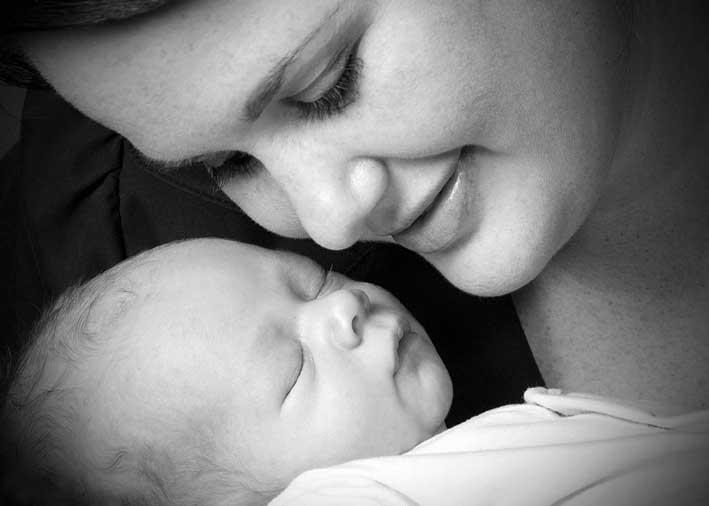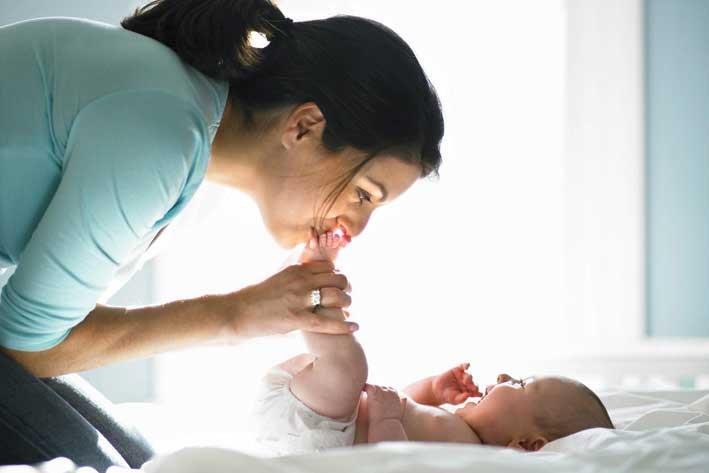I often look back on my first experience of motherhood and how I handled it. My two boys are grown up now, but onlookers then would probably have laughed at my occasionally slap-dash attitude which, despite my good intentions to get on with things, may have seemed unorthodox to some. However, it is now common for most new mothers to find themselves taking care of their first child without ever having handled a newborn before. And it can be a pretty scary moment, fraught with emotions, uncertainty and excitement.
The maternal instinct kicks in to help save the situation most times, but it is useful to hear what other mothers say, what they advise, and what they say they would or would not do again. Do new mothers make mistakes? Most times they are mostly clumsy, impractical actions which waste time, cause discomfort and do nothing to make the baby or its mother happy. But that does not make them less good as mothers or less loving, caring or dedicated.»
Learning what to expect is a must and pregnancy is a long and suitable time during which soon-to-be mums can pick up information. It's best to not just concentrate on the birth itself, though that is a major event. Once the birth is over, there is a lifetime to look forward to, and the immediate need to deal with a newcomer, a baby who is totally dependent on mum. It is a constantly evolving lesson in life, discovering the world through the eyes of the child, adapting to changes, reaching each milestone, one step at a time. Motherhood is unspeakably special and most mothers would do it all again.

A few contemplative words from Marianne Theuma – mother, grandmother, professional doula, teacher & childbirth educator
"The early days of motherhood have become very lonely. Baby comes home and reality hits home too: a crying baby in the arms of an exhausted mum, who wants to give the very best, but cannot even breastfeed. Dad wants to help but feels helpless, often giving the wrong advice.
“The centuries-old form of support given by the experienced females in the family is nowhere to be seen. Grandmas have their own career, work full-time and cannot possibly take time off. Most female friends work too, and with only one child and probably a medicated birth experience, they can barely boast of being able to share their positive experience.
“Today’s new mothers and fathers need more than practical instructions for how to change a nappy, give a bath to the baby and sterilise bottles. There are so many deeper issues to be addressed. Education, as opposed to information, must be spread over a period of years within a country’s education system, well before the blue lines on a pregnancy kit show up. A person’s self-confidence is number one on the list.
“Both parents need to be able to be assertive and make choices. These could include finding the best partner to live with, ideally long-term, timing the pregnancy well, taking responsibility for the pregnancy by eating well, exercising, and preparing physically and mentally for the big day when the baby arrives. Do the parents want to take an active or a passive role during the birth? Are they ready to master skills that go with managing labour as nature intends, or do they want others to take all the decisions for them?
“Today’s technology allows for freedom of pain during labour. Have we ever thought that labour itself as nature intended, could be nature’s way of making a mother feel strong and elated after a hard day’s work in her life? This could indeed be what boosts her self-esteem enough to carry with her throughout her parenting life. Are we robbing her of her motherly instinct and replacing it with a career instead? Is our society’s system encouraging mothers to pay others to birth and raise their children while they go on with their careers where they feel more capable?
“There certainly is a way for both mothering/fathering and careers to work together. A well-designed and well-timed education programme may find the best of both worlds, producing well-prepared parents who, with the self-confidence obtained within their family, will turn out to be self-confident and happy contributors at their place of work. That is certainly a win-win situation.”
– Marianne Theuma
PS “The latest instruction is that babies are to sleep face up on their back and not on their tummy. This is an example of what is meant by continuously keeping up-to-date in educating parents.

Voices of experience
Looking back on your first mothering experience, what would you do again?
“I would definitely breastfeed and allow baby to co-sleep” – Louise.
“I would spend as much time as possible with baby, talking as well as reading to him/her” – Georgina.
“Endure birth without Entinox and use natural oils for birth pain relief” – Marika (not the author of this article).
“Breast feeding, quitting my job to fully enjoy my son’s first years of development, travelling as much as I could to give my child a lot of experiences and impressions” – Hermine.
What would you not do again?
“I would not put baby to sleep in a pram” – Louise.
“I would not worry too much about what others thought I should do. Mothering, I feel, is a natural experience” – Georgina.
“I would not do anything except care for baby: take unpaid leave for one year and persevere with breastfeeding” – Marika.
“I would not repeat early potty training” – Hermine.
If you're a grandma, what is the most important advice you gave your daughter?
“Enjoy baby to the full” – Louise
“Find your own way to handle the baby. Every mother and baby are different and one cannot exactly standardise motherhood. Of course, there is advice to heed, however, I believe, it is a case of adopting and adapting” – Georgina.
“I am not a grandmother yet, but the advice I would give is to enjoy and spend quality time with the child as much as she can, because time cannot be turned back” – Hermine.
Since you are also a daughter, what is the most important advice your mother/grandmother gave you about mothering?
“I was reminded that babies grow so quickly, so enjoy them” – Louise.
“To give the baby as much attention as I could. Of course, the same would not apply when other siblings arrive, as the attention is then split up” – Georgina.
“One statement - Mama knows best. You are the mother and the nurse, especially during the bonding stages. Do not refuse support that family members can offer such as running, errands, cooking or house cleaning at least for the first weeks, but as far as the baby goes, you are the mother, so you take care of her” – Marika.
“Always be honest to your child” – Hermine.